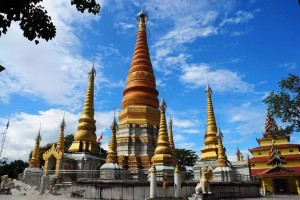Eryueba Festival of Yi Ethnic Minority in Yongping County, Dali
Basin Introduction
- Chinese Name: 大理永平县彝族二月八打歌节
- English Name: Eryueba or February 8th Festival of Yi Ethnic Minority in Yongping County, Dali
- Location: Yongping County, Dali Prefecture
The Eryueba Festival, also referred to as the Er Yue Ba Festival, is a vibrant cultural celebration observed by the Yi ethnic minority, particularly in regions like Yongping County. This festival, which typically takes place on the 8th day of the second lunar month, is deeply rooted in the agricultural traditions, mythology, and cultural practices of the Yi people. Here’s an overview of the Eryueba Festival, highlighting its significance, customs, and local activities.The Eryueba Festival is an essential celebration for the Yi ethnic minority in Yongping County, blending agricultural practices, spiritual beliefs, and cultural expressions. Through rituals, communal meals, music, dance, and various activities, the festival enriches the community’s cultural identity and strengthens social ties. It is a time of joy, reflection, and gratitude, marking the resilience and traditions of the Yi people as they embrace the arrival of spring and the agricultural season ahead.
Origins of the Eryueba Festival
The Eryueba Festival has its origins in ancient Yi agricultural rituals and is closely associated with the lunar calendar. It celebrates the arrival of spring, marking a new agricultural cycle and the start of the sowing season. Historically, the festival served as a way for the Yi people to express gratitude for a good harvest and to pray for a prosperous crop yield in the coming year.
The name “Eryueba” translates to “Eighth Day of the Second Month,” which indicates its timing on the lunar calendar. It is also linked to various mythological stories and legends that are integral to Yi culture, including tales of creation and the importance of nature.
Significance of the Festival
- Agricultural Celebration: The Eryueba Festival is primarily an agricultural celebration that marks the beginning of the planting season. It emphasizes the Yi people’s connection to the land and their reliance on successful harvests for their livelihoods.
- Cultural Identity: The festival provides an opportunity for the Yi people to express their rich cultural heritage through traditional rituals, music, dance, and clothing. It reinforces community bonds and cultural pride.
- Spiritual Observance: The festival features spiritual elements, including rituals to honor ancestors, deities, and nature. This reflects the Yi people’s deep-rooted beliefs in animism and respect for the natural world.
Local Activities and Customs
The Eryueba Festival in Yongping County is characterized by a variety of activities and customs that reflect the traditions and values of the Yi community:
- Ritual Offerings: The festival often begins with ceremonies where offerings are made to ancestors and nature spirits, accompanied by prayers for a good harvest. Rice, wine, and livestock (such as chickens or pigs) might be included in these offerings.
- Traditional Music and Dance: Music and dance play a central role in the celebrations. Local Yi communities come together to perform traditional songs and dances, often wearing colorful ethnic clothing. These performances not only celebrate cultural heritage but also serve as a form of storytelling, passing down traditions through generations.
- Culinary Traditions: Food is an essential part of the Eryueba Festival. Families prepare special dishes using locally sourced ingredients. Traditional Yi cuisine includes various meats, vegetables, and unique preparations such as “crossing the bridge noodles” and roasted meats. Sharing meals among friends and family fosters community spirit.
- Games and Competitions: The festival may include traditional games and competitions, such as archery, tug-of-war, and other sports that encourage community participation and friendly rivalry.
- Market Activities: In some villages, local markets may pop up during the festival, where vendors sell handmade crafts, traditional clothing, and local agricultural products. This creates a lively atmosphere and supports local economies.
- Fireworks and Celebrations: Fireworks are often a part of the festivities, symbolizing joy and the warding off of evil spirits. The nights may be filled with the sounds of celebration, laughter, and community bonding.
- Visiting Ancestor Graves: Some families may take the time to visit the graves of their ancestors, paying respects and honoring their memory as part of the festival’s spiritual observance.















